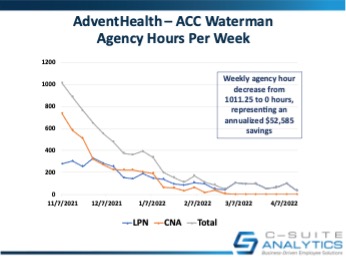Most hiring tools answer whether candidates can and will do the job, but not if they’ll stay. Learn how realistic job previews and motivational-fit interviews can improve retention from day one.
Employee Retention Secret: Make Your CFO Your Best Friend

Turning Employee Retention Data to Dollars Speaks CFO Language
This line always gets a few laughs when I speak at conferences:
Chief financial officers come to work each day looking for the coins in the couch…when their greatest unbudgeted expense is happening down the hall in Human Resources.
Have you ever had that feeling when you present turnover data to your c-suite that you are the only one who gets it? The only one who realizes turnover’s tremendous drain on profits, expenses, and productivity? Wondering why your CFO isn’t chiming in to support you is a very, very good question.
The truth is that accounting majors are driven by the data on their traditional spreadsheets, the income and balance statements that are the religion of their profession. And those data collections have no line item for turnover. This was true in 1922 just as it is in 2022. When you think of phone booths, black & white TVs, cars without seat belts…well, you get the idea. Some things change over the course of decades but in the c-suite, it is usually HR and maybe operations executives who connect the dots between turnover and productivity. And the same goes for employee engagement which essentially measures how hard your employees work. Finance is usually totally out of the loop on both.
Yet consider the power your CFO brings to the table. CFOs and their teammate CEOs speak the same language because more than half of all CEOs move upstream from a finance position.[i] So CEOs don’t adapt naturally to the ways HR or for example marketing pros think. Or speak. Their language is spreadsheets and dollar signs. So for many, turnover is just a concept. And an HR concept, one that HR should be able to easily solve with a miracle employee program or benefit.
The greatest lesson here is that when CFOs speak, CEOs listen. A few years ago I was working with a defense contractor that built rockets. We invited the CFO to participate in a turnover cost study and he said OK, giving us a curious glance. Our team determined that losing one engineer cost his company $121,450 to which he fully agreed. We stayed after and discussed where turnover fit in among other expenses, noting the high costs of his people, the materials to build rockets, and their physical space. That CFO called me the next morning to say he couldn’t sleep, that he went into the office early to extrapolate some numbers and determined turnover was his company’s second biggest cost. Victory…now he gets it.
Cost of Turnover Calculations Help CFOs Put Numbers to Employee Retention
Let me present two ideas to pull your CFO into your retention battle so she then alerts your CEO and causes turnover to become far more important at the top:
CFO inclusion idea #1: Invite your CFO or his finance designee to join you in measuring the cost of turnover for one or more jobs…and you can do this for no cost by using our free turnover cost calculator on our site.
CFO inclusion idea #2: Ask your CFO to identify and track the impact reducing turnover has on your company’s most important business metrics such as specific expense categories, overall revenue, or a narrowly-defined productivity measure.
What are examples of key business metrics impacted by turnover? For manufacturing it might be the volume of product that is shipped out the door. For call centers that metric might be reducing average call time or hold times because agents are more experienced and you have fewer new ones. And for healthcare there is one very, very big one and that is AGENCY COSTS.
A Real-World Example Employee Retention’s Costing Success to Share with Your CFOs
The draining impact of treating Covid-19 patients has caused an extreme number of nurses to quit and even abandon their profession, leaving their hospitals at great risk…and all when the number of new nurses is too low to replace the current nurse workforce where the average age of a registered nurse is 52.[ii] There just aren’t enough nurses to fill all open positions and there likely won’t be in the future either. So hospitals have no choice to hire what they call “agency”. These are the nurses provided by contracting companies that can cost up to 50% more per hour…and likely don’t provide the same level of service because they don’t know your hospitals’ systems or culture.
How much is the aggregate cost of agency nurses for hospitals? In the pandemic era, consider that overtime and agency staffing cost U.S. hospitals an extra $248 billion per year[iii]. This is the main reason hospitals are struggling for revenue today.
So here now is a success story, and one worth sharing with your top team whether you work in healthcare or any other industry. AdventHealth manages 10 care centers, some which are nursing homes and others for post-acute recovery. They invited us to reduce turnover in one location where we did, by a full 45% in six months. As importantly though was the resulting decrease in agency fees…from over $1,000 per week to zero.

This is a story worth telling, to your total top team and your CFO. Once your CFO learns the full dollar impact of retention and engagement, you’ll develop support at the top…and gain the most powerful leverage for holding leaders accountable for retention goals.
Improve Employee Retention with CFO Buy-In
Schedule a conversation with me at DFinnegan@C-SuiteAnalytics.com to discuss your employee retention roadblocks and I’ll share information with you on how you can use cost calculations and real-world case study data to get your CFO’s attention.
[1] https://www.forbes.com/sites/kimberlywhitler/2019/10/12/new-study-on-ceos-is-marketing-finance-operations-or-engineering-the-best-path-to-the-c-suite/?sh=3adcc0305e07 [1] https://www.statista.com/statistics/1227163/distribution-of-registered-nurses-in-the-us-by-age/ [1] https://www.fiercehealthcare.com/hospitals/pandemic-era-overtime-agency-staffing-costs-u-s-hospitals-extra-24b-per-year#:~:text=The%20healthcare%20industry’s%20well%2Ddocumented,a%20new%20workforce%20data%20analysis.



